
50 Years of Leadership: Past President Jessica Rosenbaum
Jess Rosenbaum was board president during a pivotal point in our history. She shared the following remembrances from her tenure.

Washington Council of Lawyers Participates in Well-Being Week In Law
It goes without saying that the past year has brought unparalleled challenges and new stresses and anxieties. Since we can’t do our best, unless we feel our best, we are excited to once again take part in Lawyer Well-Being Week. We encourage you to make time during this week to try the activities included here and then engage with us on social media using #WellbeingWeekInLaw to let us know your thoughts. Enjoy!
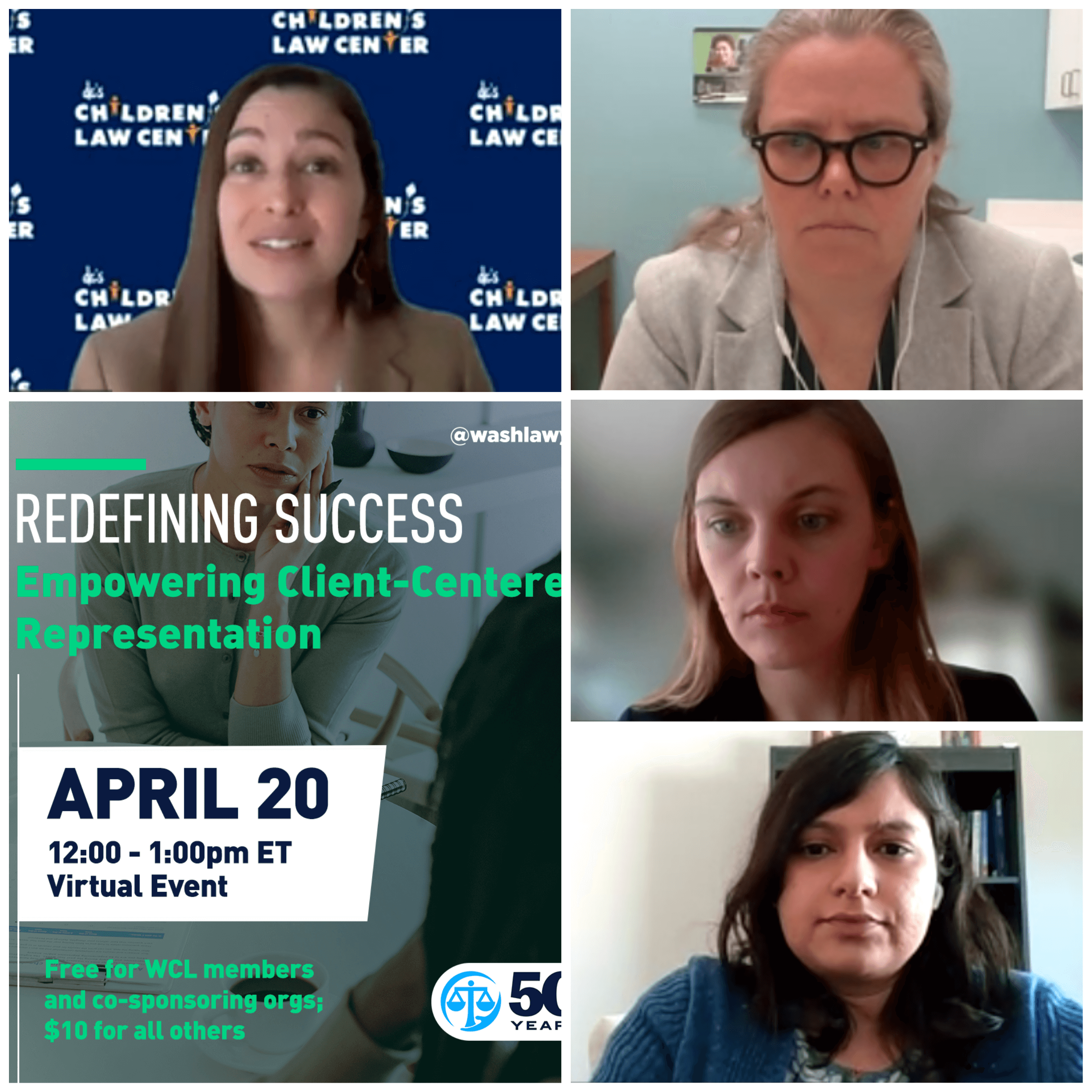
Redefining Success: Empowering Client-Centered Representation: Recap & Resources
By Shea Hazel On Wednesday, April 20, 2021, Washington Council of Lawyers hosted an inspiring session to encourage and empower client-centered representation. Redefining Success: Empowering Client-Centered Representation was moderated by Jen Masi, Pro Bono Director, Children’s Law Center, and included panelists Katherine Conway, Staff Attorney, CAIR Coalition; Tracy Davis, Managing Attorney, Bread for the City; and, Faiza Majeed, Senior Staff Attorney, Legal Aid Society of the District of Columbia. Panelists offered suggestions on client-centered approaches to counseling and legal strategies; prioritizing client agency and empowering clients through the resolution of their cases. Meet Clients Where They Are “Meeting clients where they are” requires holistic, client counseling and representative approaches, obliging lawyers to disregard any biases and actively listen. Be present and actively listen to clients’ stories to understand the injustices they experience and their unique goals and priorities. Balance legal expertise with client expertise of their lived experiences. Thank clients for calling when their cases are sources of trauma and stress, understanding they may be traumatized or retraumatized throughout the legal process. Understand some clients may be detained and have been stripped of their liberties. Respect clients’ dignity in making their own decisions and allow them the time they need to reflect and commit to legal strategies. Client-Centered Lawyering and Representation Applying principles of cultural humility can keep lawyers centered on clients’ needs and increase client advocacy and zealous representation. Support client’s agency over their cases. Honestly and realistically educate clients about possible options and outcomes (including potential consequences), to empower informed decision making. Enlist subject matter reinforcements, when needed. Prioritize client goals, first; legal strategies, second. Encourage clients to take on tasks, which may help them proceed on their own at a later date if necessary. Educate against biases and assumptions. Speak up about systemic disparities and racism. Build power within communities by conducting know-your-rights trainings and by representating organizations such as tenant associations. Connect clients to mental health or case management services where appropriate – coordinating with their providers and advocating for the clients to the provider, while acknowledging your role in representing a client’s stated interest. Revisit and redefine success throughout the attorney-client relationship. Continually reflect upon your own lawyering skills so you can continue to better deliver client-centered approaches. Successful Case Closure Clients need to be empowered, to keep moving their lives forward, after their cases have closed, regardless of the outcome. Celebrate micro-moments of success throughout the case. Reassure clients for showing up and making their -often silenced- voices heard. Help clients understand their problems so they are equipped to respond in the future. Ensure clients understand any court orders and help them prepare for and mitigate against potential challenges. Put ego aside and not expect to have the closure you might want. Preserve client relationships and understand they may call upon your services in the future. As a reminder, hearing and validating the injustice a client may have experienced while being zealous and honest about achieving real justice for them under the law, is challenging and rewarding work. If you are not taking care of yourself, you cannot take care of your clients. It is important to understand your work-life balance and prioritize your mental, spiritual, and physical health. Your ability and availability to advocate for your clients is a personal decision and there is a community of pro bono and civic-minded attorneys to collaborate with through Washington Council of Lawyers and across the District. Check out more ways to connect at Washington Council of Lawyers’ upcoming events. And continue the conversation on social media using #50YearsStrong. Shea Hazel is a law student at UMass Law and a member of Washington Council of Lawyers Advocacy Committee
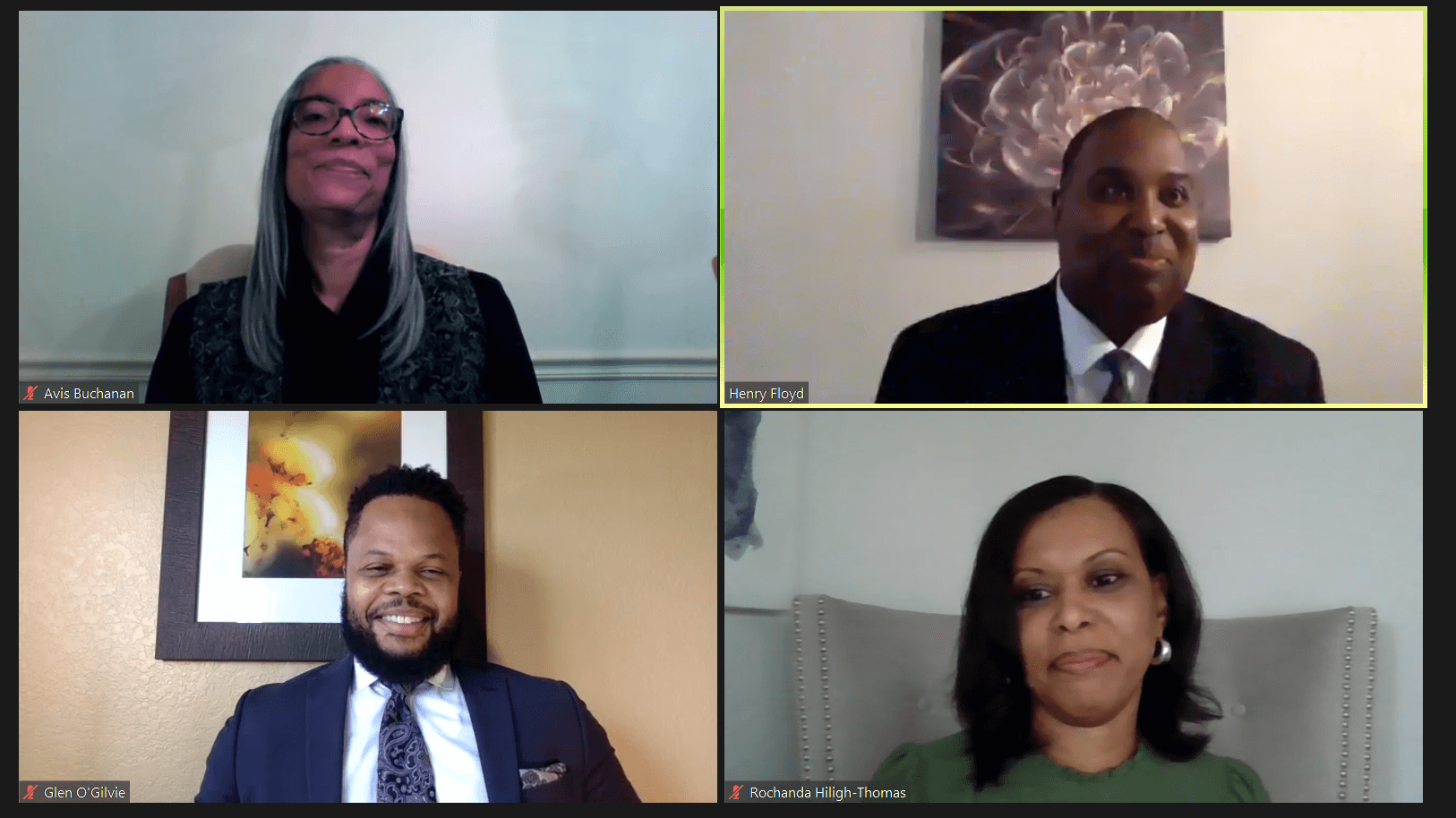
Racial Justice Series: Rising to the Top – Resources & Guidance
On Wednesday, April 14, 2021, the Washington Council of Lawyers hosted a Racial Justice Series panel: “Rising to the Top: Diverse Executive Leadership for Non-Profits.” Moderated by Henry E. Floyd, Jr., Senior Associate Attorney, Koonz McKenney Johnson & DePaolis LLP and Washington Council of Lawyers Board Member. Panelists included Avis Buchanan, Director, The Public Defender Service for the District of Columbia; Rochanda Hiligh-Thomas, Executive Director, Advocates for Justice and Education; and Glen O’Gilvie, Chief Executive Officer, Center for Non-Profit Advancement.
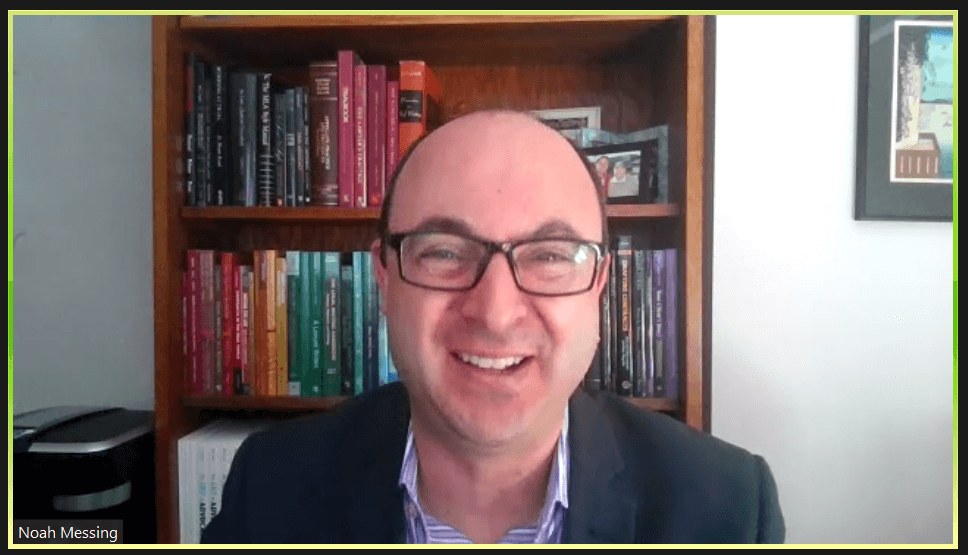
Litigation Skills Series: Legal Writing
On Thursday, April 9, 2021, Noah A. Messing, Yale Law School’s Lecturer in the Practice of Law and Legal Writing, led a legal writing workshop, the latest installation in the Washington Council of Lawyers’ Litigation Skills Series. With great skill and wit, Noah took the audience through the three main areas where lawyers can improve their writing skills: organization, prose, and drafting. Four Key Organizational Strategies Noah urged attendees to orient readers fast. Even if the memo or brief is inherently lengthy, try to frontload the important information; this allows the reader to quickly become familiar with the purpose of the document and determine its urgency. While telling a narrative, it can be tempting to simply state the facts in straightforward chronological order but introducing facts using flashbacks can help better organize your writing. Doing so can allow the reader to understand why the facts the writer has presented in the past are important and relevant to their message. Another pitfall that lawyers can easily fall into is focusing too much on rebutting their opponents’ arguments. Noah urges lawyers to focus on winning, THEN rebutting. This means not only showing the flaws in your opponents’ arguments; it means clearly demonstrating why your arguments are more persuasive and the correct way for the Court to decide. But how does one go about creating a structure to organize all of this information? Noah introduced attendees to the idea of CRAC, which stands for Conclusion, Rule, Application, and Conclusion. This method is a simple way to ensure that your arguments and messages stay neatly organized. Five Strategies for Better Prose When dealing with complex issues, it can be easy for lawyers to fall into the trap of writing long and complicated sentences and paragraphs as they try to address every part of their argument. However, this can cause the reader to feel as if they were in a confusing labyrinth, quickly losing track of where the writer was trying to lead them. To combat that, Noah encourages writers to write short sentences and paragraphs. This does not mean writing curt or robotic-sounding prose; it rather means to vary the length of your sentences to ensure that your message is clear and easy to follow. He also encourages writers to use active and short verbs. Try keeping your writing in the active voice and watch out for passive verbs. On that note, pay attention to the length of the words you choose – notice the number of syllables in the words you choose. This does not mean you have to count out the syllables in each word but rather encourages the writer to keep their language clear and concise. Noah also encourages writers to place familiar information before new information. Start by setting a foundation for the reader, including providing who the parties are and defining unknown terms, such as names of projects. To keep the reader on track for where you want to go, use “signposts” to let the reader know where you are trying to lead them. And be sure to get to the subject of the sentence and the principal verb quickly; nothing loses a reader more than having to wade through lengthy clauses to find the point of the sentence. Five Tips for Drafting Anticipate issues. As the old saying goes, hope for the best, but prepare for the worst. Being a good lawyer requires one to be prepared for any and all possible outcomes, so be sure to consider additional options when listing who your messages apply to. Be sure to have all of your bases covered. Watch for Ambiguity. Ambiguous language can be the downfall of even the best attorney. Be sure to make sure that your language is specific. Watch for Vagueness. Notice wiggle room in the terms you write? Your opponents can use that to their advantage. Ensure that your language is not vague to allow your message to be as impactful as you mean it to be. Watch for Inconsistencies. Even the tiniest details matter! Ensure that you are consistent throughout your writing, whether it be through how you refer to the parties or whether you capitalize certain words. Find Good Precedent. Good writing is nothing without the precedent and the research to back it up! Noah captivated attendees not only through these useful lessons but also with his sense of humor and his ability to present these lessons in a fun and interesting way. Using great metaphors and visual examples, attendees were able to easily grasp the skills that will help them become better writers and better lawyers. Want to learn how to become a better litigator? Sign up for our next events in our Litigation Skills Series here. Caitlyn Burnitis is a Staff Attorney at the Amara Legal Center and a member of the Washington Council of Lawyers Communications Committee.
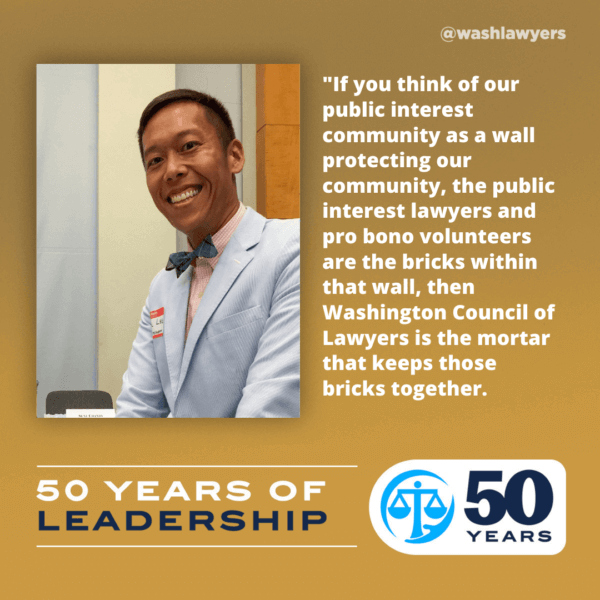
50 Years of Leadership: Past President Paul Lee
Leadership starts from within. Paul Lee, board president from 2014-2016, knew that as he began his presidency during a time of growth. During his tenure, Washington Council of Lawyers expanded its staff and offerings of programming, trainings, events, and ways to come together to accomplish our mission in new and exciting ways.

50 Days for 50 Years Membership Drive
Washington Council of Lawyers was founded in 1971, which makes this our 50th Anniversary year! To celebrate the occasion, we are holding a 50 Days for 50 Years Membership Drive, now through May 20. It’s the perfect time to join DC’s only public-interest bar association! Our membership is comprised of hundreds of attorneys and supporters from law firms, federal and local government agencies, nonprofit organizations, and law schools; we have one main thing in common — we care deeply about access to justice for our DC neighbors. If you do, too, we would appreciate your membership and welcome you officially into this wonderful community. As a member, you will enjoy: Member-only events Free or reduced rates at programs Networking opportunities Our Public Interest Jobs Clearinghouse emailed to you on the 1st and 15th of each month As an added bonus, when you join now, you will receive a two-year membership for the cost of one, effectively a 50% reduced rate! Act quickly! The 2-year offer for new members ends on May 19. Join today, and then plan to meet other members at Lawyers with a Fine Palate, a virtual wine-tasting event to welcome all of our members. It’s the perfect way to celebrate your official membership! Join us today!
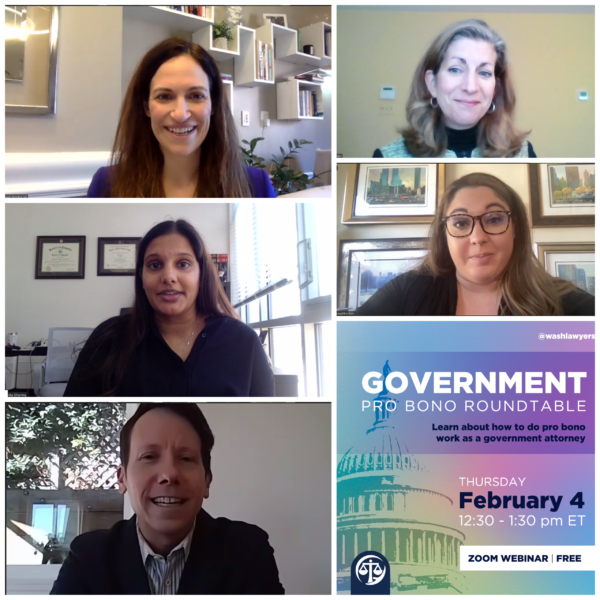
Government Pro Bono Roundtable (2021)
On Thursday, February 4, 2021, Washington Council of Lawyers hosted its annual Government Pro Bono Roundtable. To meet the great need for pro bono lawyers in the District, our expert panel discussed ways to find pro bono projects, presented legal considerations to avoid conflicts of interest, and connected government lawyers with the vast network of support and mentorship available.
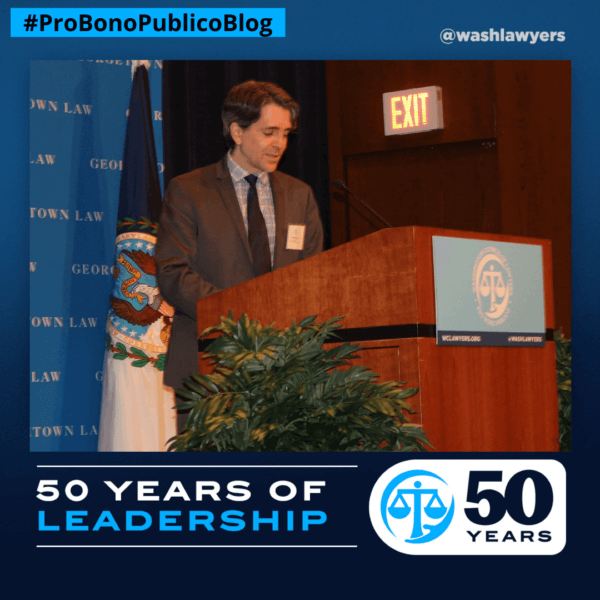
50 Years of Leadership: Past President David Steib
As we celebrate 50 years of working to ensure that our legal system treats everyone fairly, regardless of money, position, or power, we recognize and appreciate the leaders that moved us forward in the fight for access to justice for all. Without the stalwart leadership, unwavering commitment, and insightful guidance of our past board presidents, we would not be the organization we are today. Over the next months, we will highlight some of our past presidents and take a look at the state of the world during their tenure and the initiatives and priorities they oversaw that helped us grow. Our first highlighted past president is our most recent past president. David Steib was board president from 2018-2020, a tumultuous time for our country.






